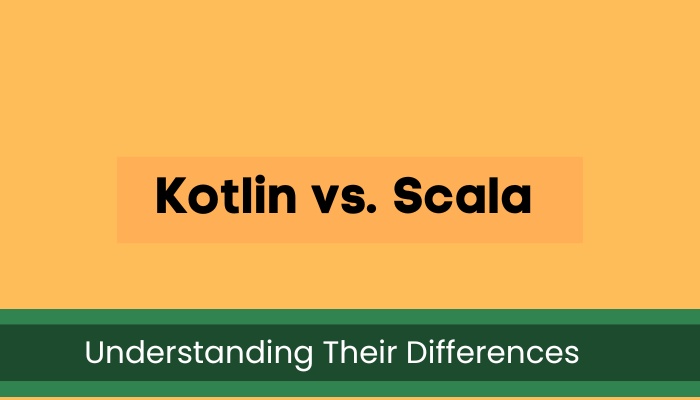INTRODUCTION
Brief overview of Kotlin
Brief overview of Scala
Importance of understanding the differences between Kotlin and Scala
Kotlin and Scala are both popular programming languages in the world of software development, but they serve different purposes and have distinct characteristics. This article aims to provide a comprehensive comparison between Kotlin and Scala, highlighting their similarities, differences, and the scenarios in which each language excels.
Similarities between Kotlin and Scala
- Conciseness in code
- Support for functional programming
- Interoperability with Java
Conciseness in Code
Both Kotlin and Scala are known for their concise and expressive syntax. They allow developers to write less code while achieving the same functionality, resulting in improved readability and maintainability.
Support for Functional Programming
Both languages offer robust support for functional programming paradigms. They provide features like first-class functions, lambdas, and immutability, making it easier to write functional code.
Interoperability with Java
One of the key advantages of Kotlin and Scala is their seamless interoperability with Java. Developers can easily integrate Java libraries and code into their projects, which is particularly beneficial for those transitioning from Java.
Syntax Differences
- Kotlin's simplified syntax
- Scala's powerful and flexible syntax
Kotlin's Simplified Syntax
Kotlin is renowned for its straightforward and clean syntax. It eliminates boilerplate code, making it an excellent choice for developers who want to write code quickly and with minimal fuss.
Scala's Powerful and Flexible Syntax
Scala, on the other hand, is known for its expressive and flexible syntax. It allows developers to write code in various styles, including object-oriented and functional, giving them a wide range of options and control over their code.
Type Systems
- Kotlin's type inference
- Scala's strong and static type system
Kotlin's Type Inference
Kotlin features smart type inference, reducing the need for explicit type declarations. This simplifies code and enhances readability, making it an ideal choice for developers who value productivity.
Scala's Strong and Static Type System
Scala boasts a strong and static type system that catches errors at compile time, ensuring code reliability. This is crucial for larger projects where early error detection is a priority.
Performance and Execution
- Kotlin's focus on performance
- Scala's richer runtime environment
Kotlin's Focus on Performance
Kotlin prioritizes performance and aims to be as efficient as Java. This makes it a great choice for Android app development, where speed and responsiveness are essential.
Scala's Richer Runtime Environment
Scala offers a more extensive runtime environment and is suitable for projects where performance is critical, but the added overhead is acceptable. It shines in domains like big data processing and high-performance computing.
Tooling and Community Support
- Kotlin's seamless integration with Android Studio
- Scala's robust tooling ecosystem
Kotlin's Seamless Integration with Android Studio
For Android app development, Kotlin is the clear winner. It integrates seamlessly with Android Studio, making it the go-to choice for Android developers worldwide.
Scala's Robust Tooling Ecosystem
Scala benefits from a mature and extensive tooling ecosystem, with strong support from the community. It offers a variety of development tools, libraries, and frameworks for different use cases.
Adoption and Industry Usage
- Kotlin's rise in popularity and adoption
- Scala's strong presence in certain domains
Kotlin's Rise in Popularity and Adoption
Kotlin has gained significant traction, especially in the Android development community. It is officially supported by Google and has become the preferred language for Android app development.
Scala's Strong Presence in Certain Domains
Scala maintains a strong presence in domains like finance and big data, where its powerful features and expressive syntax are well-suited for complex and data-intensive applications.
Scalability and Maintenance
- Kotlin's simplicity for small to medium-sized projects
- Scala's power and scalability for large projects
Kotlin's Simplicity for Small to Medium-sized Projects
Kotlin's simplicity and ease of learning make it an excellent choice for small to medium-sized projects. Developers can quickly build applications without the complexities of a more robust language like Scala.
Scala's Power and Scalability for Large Projects
Scala excels in large and complex projects, offering powerful abstractions and expressive syntax that facilitate the management of extensive codebases.
Conclusion
- Summary of the key differences between Kotlin and Scala
- Considerations for choosing between Kotlin and Scala based on project requirements
- Overall recommendation based on strengths and limitations of both languages
In summary, both Kotlin and Scala have their strengths and weaknesses. The choice between them depends on your specific project requirements. For Android development and smaller projects, Kotlin's simplicity and performance make it a top choice. On the other hand, Scala's robust features and scalability shine in larger and more complex applications. Consider your project's scope and goals when deciding which language to use.
Read My More Articles- THE ROLE OF SEO VIRTUAL ASSISTANTS IN SMALL BUSINESS PROSPERITY

No comments yet